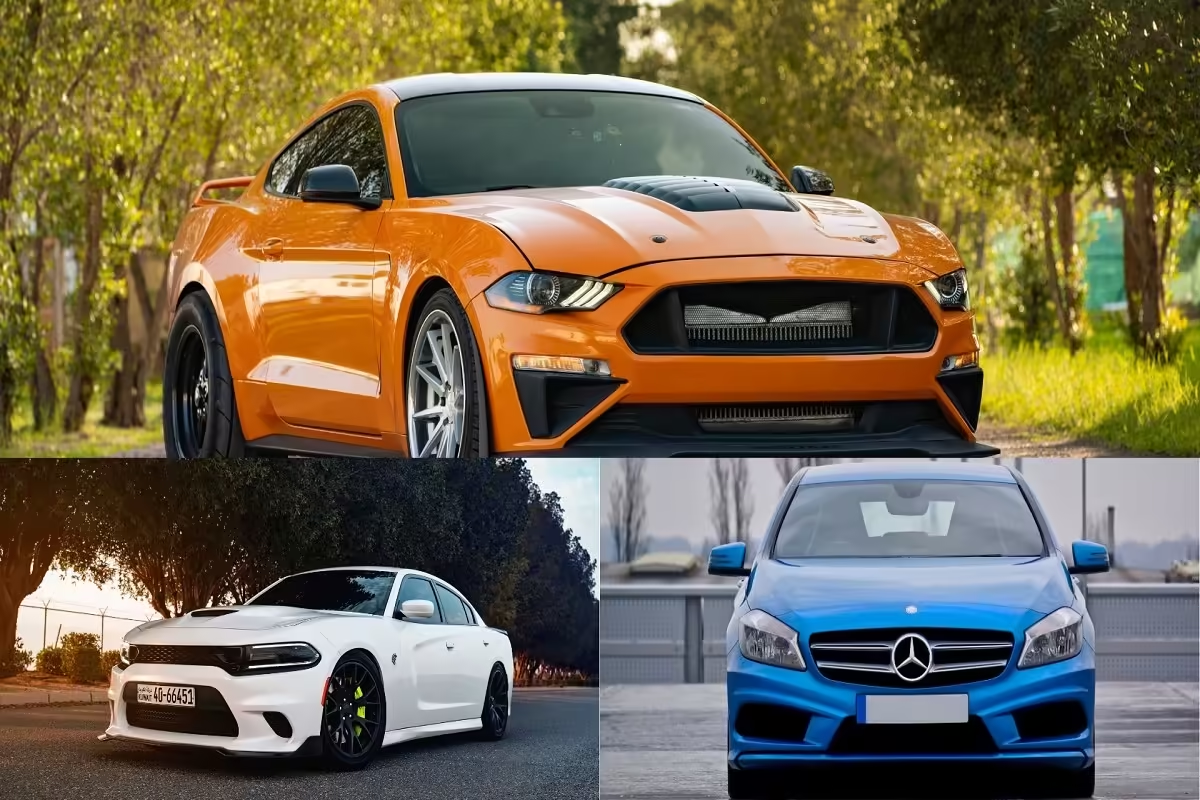Purchasing a car is a very panicky task. In this article, we are going to explain the experience what is the difference between Petrol Vehicles, CNG Vehicles, and Diesel Vehicles which one is pocket-friendly and how much money can you save over the period?
Petrol Vehicle Features and Benefits
Petrol vehicles, powered by gasoline, offer several features and benefits that have made them popular worldwide. Here are some key points:

Features of Petrol Vehicles:
- Internal Combustion Engine (ICE): They use an internal combustion engine that runs on gasoline, which is known for its high energy density.
- Wide Availability: Gasoline is widely available, making refuelling convenient in most regions.
- Performance: Petrol engines typically provide smooth and responsive acceleration, with high RPM capabilities that often deliver a sportier driving experience.
- Lower Weight: Petrol engines are generally lighter than diesel engines, contributing to better handling and agility.
- Advanced Technology: Modern petrol vehicles come with various technological advancements, including turbocharging, direct fuel injection, and advanced emissions control systems.
Benefits of Petrol Vehicles:
- Lower Initial Cost: Petrol vehicles usually have a lower purchase price compared to diesel vehicles or electric vehicles
- Maintenance: They often have lower maintenance costs due to simpler engine designs and fewer components.
- Reduced Noise: Petrol engines typically run quieter than diesel engines.
- Emissions: Modern petrol engines emit fewer particulates and NOx compared to older diesel engines, especially with advanced emission controls.
- Performance: They offer quick acceleration and high-speed capabilities, making them ideal for city driving and long-distance travel.
- Fuel Efficiency: While less fuel-efficient than diesel, improvements in technology have made petrol engines more efficient.
- Versatility: Petrol vehicles are available in a wide range of models, from compact cars to high-performance sports cars.
These features and benefits make petrol vehicles a versatile and popular choice for many drivers around the world.
You May Like: WHAT IS CIBIL CREDIT SCORE AND HOW DO WE KNOW IT?
CNG Vehicle Features and Benefits
Compressed Natural Gas (CNG) vehicles use natural gas stored at high pressure as a fuel source. They offer several features and benefits:

Features of CNG Vehicles:
- Dual-Fuel Capability: Many CNG vehicles can operate on both CNG and gasoline, offering flexibility in fuel choice.
- Refueling Infrastructure: CNG refuelling stations are available, although less common than gasoline stations. Home refuelling options are also available.
- Storage Tanks: These vehicles have specially designed high-pressure tanks to store natural gas safely.
- Emission Control Systems: CNG vehicles come with advanced emission control systems to reduce pollutants.
- Lower Maintenance: CNG burns cleaner than gasoline or diesel, resulting in less engine wear and lower maintenance costs.
Benefits of CNG Vehicles:
- Environmental Impact: CNG produces fewer emissions of carbon monoxide, nitrogen oxides, and particulate matter, reducing air pollution and greenhouse gases.
- Cost-Effective: CNG is often cheaper than gasoline or diesel, leading to lower operating costs.
- Performance: CNG vehicles have comparable performance to their gasoline counterparts, with quick refuelling times.
- Domestic Availability: Natural gas is abundant in many countries, reducing reliance on imported oil.
- Safety: CNG has a narrow flammability range and is lighter than air, so it disperses quickly in case of a leak, reducing the risk of fire.
These features and benefits make CNG vehicles a viable alternative to eco-friendly and cost-effective transportation.
Diesel Vehicle Features and Benefits
Diesel vehicles use diesel fuel, which is more energy-dense than gasoline, resulting in certain distinctive features and benefits. Here’s an overview:

Features of Diesel Vehicles:
- Engine Efficiency: Diesel engines are typically more fuel-efficient than gasoline engines, converting more of the fuel’s energy into mechanical work.
- Turbocharging: Many diesel engines feature turbochargers, which increase power output and efficiency.
- Durability: Diesel engines are built to withstand higher compression ratios, making them more robust and longer-lasting.
- Torque Output: Diesel engines produce more torque at lower RPMs, which is beneficial for heavy-duty tasks and towing.
- Fuel Injection: Diesel vehicles use direct fuel injection systems, which improve fuel atomization and combustion efficiency.
Benefits of Diesel Vehicles:
- Fuel Economy: Diesel engines can be 20-30% more fuel-efficient than gasoline engines, leading to lower fuel costs.
- Longer Engine Life: Diesel engines often have a longer operational lifespan due to their durable construction.
- Higher Energy Density: Diesel fuel contains more energy per gallon than gasoline, providing more mileage.
- Reduced CO2 Emissions: Per unit of energy, diesel fuel emits less CO2 than gasoline.
- Better Performance for Heavy Loads: Diesel engines are ideal for vehicles that need to haul heavy loads, like trucks and buses, due to their high torque.
- Availability: Diesel fuel is widely available, particularly in regions where diesel-powered vehicles are common.
These features and benefits make diesel vehicles well-suited for commercial and personal use, particularly where fuel efficiency and durability are key considerations.
How and how much can you save?
When comparing petrol, CNG (compressed natural gas), and diesel vehicles, several factors come into play, including fuel costs, efficiency, environmental impact, and maintenance. Here’s a breakdown:
Fuel Cost and Efficiency
- Petrol Vehicles:
- Fuel Cost: Petrol is generally more expensive than CNG and slightly less expensive than diesel, depending on the region.
- Fuel Efficiency: Petrol vehicles are less fuel-efficient compared to diesel and CNG. Typically, a petrol car might give 10-15 km per liter.
- CNG Vehicles:
- Fuel Cost: CNG is usually the cheapest of the three fuels.
- Fuel Efficiency: CNG vehicles are highly efficient, with fuel economy often exceeding 20 km per kg of CNG.
- Diesel Vehicles:
- Fuel Cost: Diesel is typically cheaper than petrol but more expensive than CNG.
- Fuel Efficiency: Diesel engines are more fuel-efficient than petrol, often achieving 15-20 km per litre or more.
Cost Savings
- Initial Cost:
- Petrol: Generally, petrol cars are cheaper to purchase.
- CNG: CNG cars can be more expensive upfront due to the cost of the CNG kit.
- Diesel: Diesel cars are usually more expensive than petrol cars but can be cheaper than CNG vehicles depending on the model.
- Running Cost:
- Petrol: Higher running cost due to higher fuel prices and lower efficiency.
- CNG: Lowest running cost due to cheaper fuel and higher efficiency.
- Diesel: Moderate running cost due to better fuel efficiency but higher fuel prices than CNG.
Environmental Impact
- Petrol: Higher carbon emissions and pollutants compared to CNG.
- CNG: Lower emissions, making it the most environmentally friendly option among the three.
- Diesel: Diesel engines emit more nitrogen oxides and particulate matter, though they produce less CO2 compared to petrol.
Maintenance Costs
- Petrol: Generally lower maintenance costs due to simpler engine mechanics.
- CNG: Slightly higher maintenance costs due to the need for regular checks on the CNG system.
- Diesel: Higher maintenance costs due to more complex engine systems and the need for more frequent servicing.
Savings Over Time
Here’s a rough estimate of potential savings:
- Fuel Cost Savings Over 1 Year (assuming 15,000 km/year):
- Petrol: At 12 km/l and $1.2 per litre, cost = $1,500.
- CNG: At 20 km/kg and $0.6 per kg, cost = $450.
- Diesel: At 18 km/l and $1 per litre, cost = $833.
- 5-Year Savings:
- CNG vs. Petrol: Savings ≈ $5,250
- Diesel vs. Petrol: Savings ≈ $3,335
- CNG vs. Diesel: Savings ≈ $1,915
You can take finance or you can take cash.
Deciding whether to finance a vehicle or buy it outright with cash involves weighing several financial and personal factors. Here’s a detailed comparison of both options:
Buying with Cash
Advantages:
- No Interest Payments:
- Paying with cash means you avoid interest charges, which can save a significant amount over the loan term.
- No Debt:
- You own the vehicle outright, so you don’t have any ongoing debt obligations.
- No Monthly Payments:
- You have no monthly car payments, freeing up cash flow for other expenses or investments.
- Better Price Negotiation:
- Cash buyers may have better leverage to negotiate a lower price since the sale is straightforward for the dealer.
- No Credit Impact:
- Paying cash doesn’t affect your credit score, and there’s no risk of negative marks from missed payments.
- Flexibility:
- You’re not tied down to any financing terms and can sell the car at any time without worrying about loan payoff.
Disadvantages:
- Liquidity Reduction:
- Tying up a large amount of cash in a vehicle reduces your liquidity, which might be needed for emergencies or investments.
- Opportunity Cost:
- The money spent on the car could be invested elsewhere, potentially earning returns that exceed the cost of a car loan.
- Limited Budget:
- Paying cash may limit the type and quality of car you can afford, as you’re restricted to the available cash.
Financing the Vehicle
Advantages:
- Preserves Cash:
- Financing allows you to keep your cash reserves intact for other uses, such as investments or emergencies.
- Improves Credit:
- Consistent, on-time payments on a car loan can improve your credit score.
- Better Budgeting:
- Financing spreads the cost over time, making it easier to manage monthly expenses and budget effectively.
- Access to Better Vehicles:
- Financing can allow you to afford a better or newer vehicle than you could with a cash purchase.
- Leverage Low-Interest Rates:
- If you can secure a low interest rate, the cost of financing might be minimal compared to the benefits of preserving your cash.
Disadvantages:
- Interest Costs:
- Financing a vehicle means paying interest, which increases the total cost of the car over time.
- Debt Obligation:
- You have a debt to manage, which can affect your financial stability and future borrowing capacity.
- Potential Negative Equity:
- Cars depreciate quickly, and you might end up owing more on the loan than the car’s value.
- Risk of Repossession:
- Failure to make payments can lead to repossession and negatively impact your credit score.
- Complicated Negotiation:
- Financing can make the car purchase process more complex, with potential fees and the need to negotiate loan terms.
Which is the Better Decision?
It depends on your financial situation and goals:
- Cash Purchase:
- Ideal if you have sufficient savings and don’t want ongoing debt. It’s a good option if you prioritize simplicity and long-term savings over liquidity.
- Financing:
- Suitable if you want to keep your cash for other uses or investments, can secure a low interest rate, and prefer to spread the cost over time. It’s beneficial for improving your credit score and accessing better vehicles.
Key Considerations: - Current Savings: Can you comfortably afford the car without impacting your financial stability?
- Interest Rates: Are you eligible for low-interest financing?
- Investment Opportunities: Could the cash be better used elsewhere?
- Long-Term Financial Goals: How does each option align with your financial plans?
Example Scenarios: - If you have $20,000 saved and a car you like costs $18,000, paying cash might be reasonable if it leaves you with a comfortable emergency fund.
- If the same $20,000 could earn a higher return invested, financing the car at a low interest rate could be more financially beneficial.
Assess your financial situation, goals, and preferences to make the most informed decision. - Click here to know the EMI.
What documents are required for finance?
When financing a car, you’ll need to provide several documents to prove your identity, financial stability, and ability to repay the loan. The exact requirements can vary by lender, but the following are commonly requested documents:
1. Proof of Identity:
- Driver’s License: A valid driver’s license or any other government-issued ID.
- Passport: In some cases, a passport may be accepted.
- Social Security Number (SSN) or Individual Taxpayer Identification Number (ITIN): For credit checks and verification.
2. Proof of Income:
- Pay Stubs: Recent pay stubs (typically from the last two to four weeks) to verify income.
- Tax Returns: Copies of tax returns from the past two years, especially if you are self-employed.
- Bank Statements: Recent bank statements (last three to six months) showing income deposits.
- Letter from Employer: A letter verifying your employment status and income.
- Proof of Additional Income: Documentation of other sources of income, such as rental income or investment earnings.
3. Proof of Residence:
- Utility Bills: Recent utility bills (electricity, water, gas) with your name and address.
- Lease Agreement or Mortgage Statement: Documentation showing your residence.
- Voter Registration Card: If applicable, to confirm your address.
4. Proof of Insurance:
- Insurance Card: Proof of current auto insurance coverage.
- Insurance Policy Documents: Copies of your auto insurance policy or a declaration page showing coverage details.
5. Vehicle Information:
- Vehicle Purchase Agreement: A sales contract or purchase agreement for the vehicle.
- Vehicle Identification Number (VIN): The VIN of the car being financed.
- Trade-in Information: If you’re trading in another vehicle, you may need the title and any payoff information.
6. Credit Information:
- Credit Report Authorization: Permission for the lender to check your credit history.
- Co-signer Information: If applicable, documents from a co-signer, including their proof of income, identity, and credit information.
7. Financial Information:
- Debt Information: Details of any outstanding debts or loans.
- Assets Documentation: Information on other assets, such as property or investments, if needed.
8. Employment Verification:
- Employment Letter: A letter from your employer confirming your job and income.
- Employment Contract: If you’re under a contract, you may need to provide a copy.
9. Down Payment Verification:
- Bank Statement: To prove you have funds for the down payment.
- Cashier’s Check or Money Order: If you’re making the down payment upfront.
10. Additional Documentation:
- References: Some lenders might ask for personal or professional references.
- Previous Loan Statements: If you’ve had auto loans before, you might need to provide statements showing your payment history.
Tips for Preparation:
- Gather Documents in Advance: Have all necessary documents ready to expedite the financing process.
- Verify Information: Ensure all documents are up-to-date and accurately reflect your current situation.
- Consult with the Lender: Check with your specific lender for any additional requirements they may have.
Preparing these documents ahead of time will help streamline the financing process and increase your chances of securing the loan.
Conclusion
CNG Vehicles: Offer the most significant fuel cost savings and environmental benefits but require an initial higher investment and regular system maintenance.
Diesel Vehicles: Provide moderate savings on fuel costs and better fuel efficiency but have higher maintenance and environmental costs.
Petrol Vehicles: Are generally cheaper to buy but cost more to run and maintain in the long term.
Choosing between these vehicles depends on your budget, environmental considerations, and the distances you intend to travel regularly.

